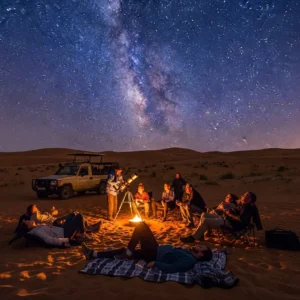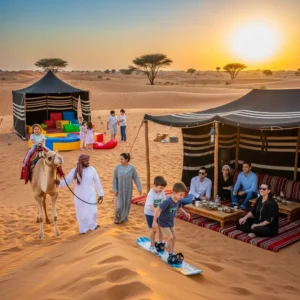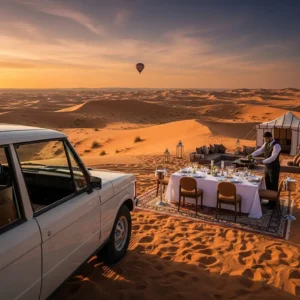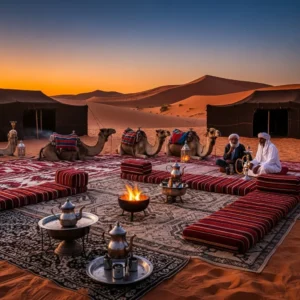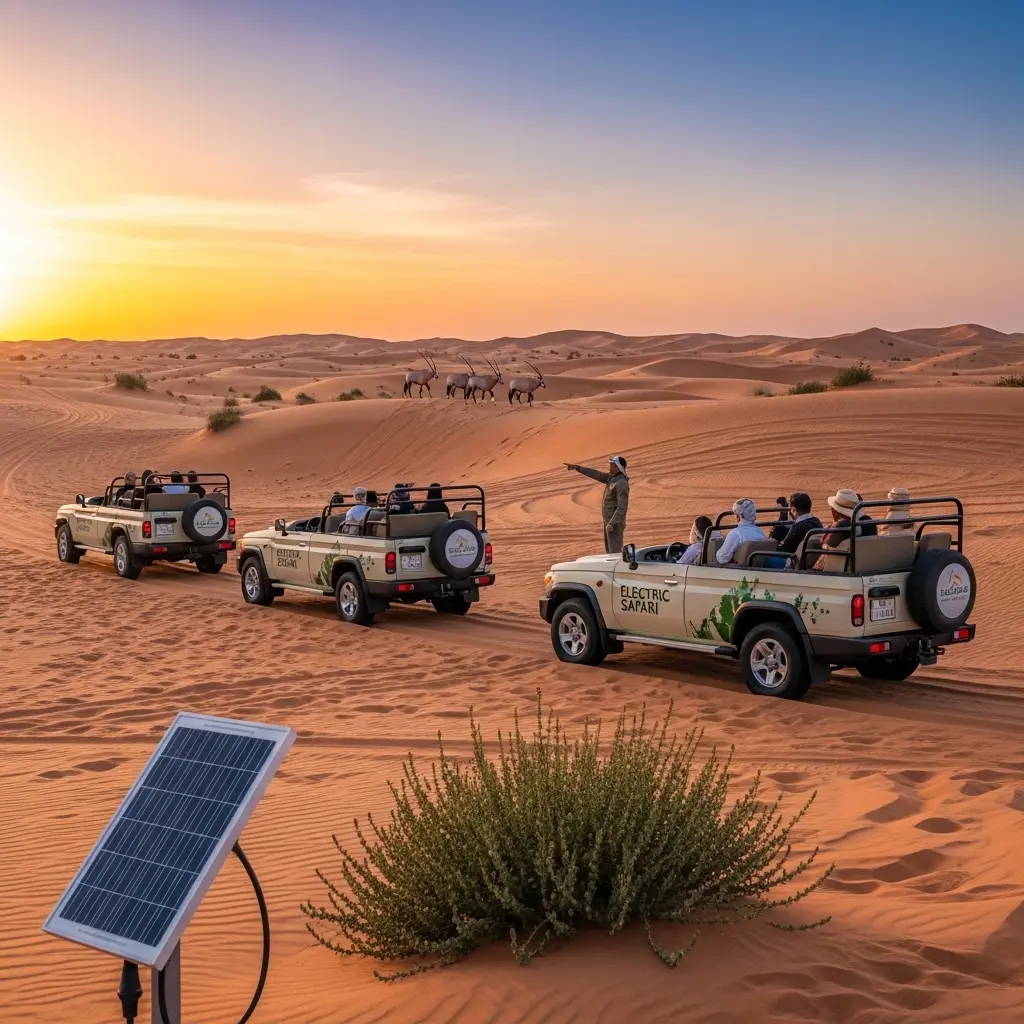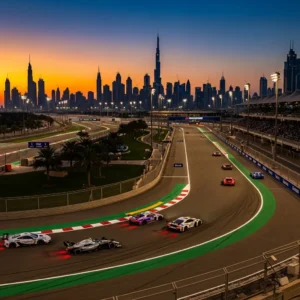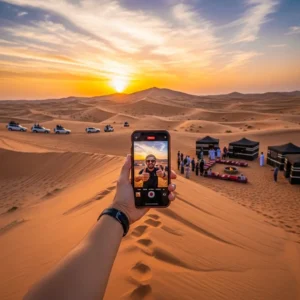A Guide to Choosing an Eco-Friendly Desert Safari: 7 Factors for a Sustainable Adventure
A desert safari is a breathtaking journey into the majestic heart of the Arabian wilderness, an experience that tops the list for most visitors to Dubai. However, as travelers become more conscious of their environmental and cultural impact, a critical question emerges: How can you enjoy this iconic adventure in a way that is respectful and sustainable? The answer lies in choosing a truly eco friendly desert safari.
An eco-friendly tour is about much more than just not leaving litter behind. It’s a holistic approach to tourism that prioritizes the conservation of the fragile desert ecosystem, promotes the ethical treatment of wildlife, and fosters a deep respect for the local Bedouin culture.
This in-depth guide is designed for the conscious traveler. We will explore the seven key pillars that define a genuinely eco friendly desert safari, providing you with the knowledge to ask the right questions, vet tour operators, and make a choice that is not only thrilling but also leaves a positive footprint on the pristine landscape you’ve come to admire.
What Does “Eco-Friendly” Mean in the Desert?
Before we dive into the checklist, it’s vital to understand the context. The desert, while seemingly vast and resilient, is an incredibly fragile ecosystem.
The Fragility of the Desert Ecosystem
The desert landscape and its unique flora and fauna have evolved over millennia to survive in extreme conditions. Off-road driving in unrestricted areas can cause irreparable damage to the delicate vegetation and the topsoil, leading to erosion. Feeding wild animals can disrupt their natural behaviors and create dependency. Improperly managed camps can generate enormous amounts of waste and pollute the environment. A responsible tour operator understands these risks and takes active steps to mitigate them.
A Holistic Approach: Beyond Just “Green”
A truly eco friendly desert safari encompasses three core principles:
- Environmental Conservation: Actively working to protect the desert landscape, its wildlife, and its natural resources.
- Cultural Sustainability: Respectfully and authentically representing the local Bedouin heritage and ensuring the community benefits from tourism.
- Animal Welfare: Ensuring that all animals involved in the tour, particularly camels, are treated with kindness and respect.
The 7 Pillars of a True Eco-Friendly Desert Safari
When evaluating a tour operator, look for a strong commitment to these seven key areas.
1. Operation Within a Protected Conservation Reserve
This is perhaps the single most important indicator of a responsible tour.
- What to Look For: Choose an operator that is officially licensed to conduct tours within the Dubai Desert Conservation Reserve (DDCR). The DDCR is a vast, protected area of land dedicated to preserving the desert’s natural heritage.
- Why It Matters: The DDCR has a strict code of conduct that all operators must follow. This includes using designated routes for driving, maintaining safe distances from wildlife, and adhering to strict environmental standards. Your tourism fee also contributes directly to the conservation efforts within the reserve.
2. Responsible Driving and Dune Bashing Practices
While thrilling, dune bashing must be conducted responsibly.
- What to Look For: An eco friendly desert safari provider will ensure their drivers stick to established tracks to minimize soil erosion and avoid damaging delicate desert plants. Their vehicles will be meticulously maintained to prevent oil or fluid leaks, which can contaminate the sand.
- Why It Matters: Irresponsible off-roading, or “dune-cutting,” can carve ugly scars into the landscape and destroy the habitats of small desert creatures.
3. Ethical and Respectful Wildlife Interactions
One of the great joys of a desert safari is the chance to see native wildlife.
- What to Look For: A responsible guide will encourage you to observe animals like the Arabian Oryx and sand gazelles from a respectful distance. They will never feed the animals or allow guests to do so. The goal is to observe, not to interfere.
- Why It Matters: Feeding wild animals disrupts their natural foraging habits, can make them ill, and creates an unhealthy dependency on humans. An eco friendly desert safari prioritizes the long-term well-being of the desert’s native inhabitants.
4. Sustainable Camp Operations
The Bedouin-style camp is the heart of the evening experience, and how it is managed is a key test of an operator’s green credentials.
- What to Look For:
- Power: Camps powered partially or fully by solar energy.
- Waste Management: A comprehensive system for segregating waste for recycling. A true eco friendly desert safari camp will leave no trace.
- Water Conservation: Use of water-saving taps and a clear policy to conserve this precious desert resource.
- Why It Matters: A large safari camp can have a significant environmental footprint. Sustainable practices in energy, water, and waste management are crucial to minimizing this impact.
5. Elimination of Single-Use Plastics
This is a very tangible and impactful measure.
- What to Look For: The best eco-friendly operators have completely eliminated single-use plastic water bottles. Instead, they provide filtered drinking water stations and encourage guests to use reusable cups. They will also use proper, washable cutlery and plates for the dinner buffet instead of disposable ones.
- Why It Matters: Plastic waste is a major environmental threat. A single tour can avoid using hundreds of plastic bottles, making a significant collective difference over a season.
6. Authentic Cultural Respect and Engagement
An eco friendly desert safari is also culturally sustainable.
- What to Look For: The experience should feel authentic and respectful, not like a caricature. This includes employing knowledgeable Emirati or long-term resident guides, presenting traditional practices like falconry with a focus on heritage and conservation, and serving authentic regional cuisine.
- Why It Matters: Sustainable tourism respects and supports the local culture, ensuring that traditions are preserved and that the community benefits from tourism.
7. High Standards of Animal Welfare (Camels)
The well-being of the camels used for rides is a critical ethical consideration.
- What to Look For: The camels should look healthy, well-fed, and calm. The handlers should treat them with kindness and patience. The number of rides each camel gives per day should be reasonably limited to prevent exhaustion. An operator committed to being an eco friendly desert safari will be transparent about their animal welfare standards.
- Why It Matters: As a conscious traveler, you have the power to support operators who treat their animals humanely.
How to Find and Vet an Eco-Friendly Operator
Questions to Ask Before You Book
Don’t be afraid to ask specific questions before you commit:
- “Does your tour operate inside the Dubai Desert Conservation Reserve (DDCR)?”
- “What is your policy on single-use plastics? Do you provide filtered water?”
- “What measures do you take to ensure the welfare of your camels?”
- “Is your camp powered by solar energy?”
A truly eco-friendly operator will be proud to answer these questions and detail their sustainability initiatives.
Finding Clues Online
Look for evidence on the operator’s website. Do they have a dedicated page or section for their sustainability or environmental policy? Do they mention their partnership with the DDCR? A provider like https://royaldesertadventures.ae/ that is serious about its responsibilities will often highlight its eco-friendly practices. When browsing large platforms like https://dubaidesertsafarie.com/ or https://hafiztourism.com/, you’ll need to click through to the specific tour descriptions to look for these details.
Conclusion: An Adventure You Can Feel Good About
Choosing an eco friendly desert safari is an investment in the future of the very landscape you have come to admire. It ensures that the pristine beauty of the dunes, the health of the native wildlife, and the richness of the Bedouin culture are preserved for generations to come. By using this guide to make an informed choice, you can embark on a thrilling adventure with the peace of mind that comes from knowing you are traveling responsibly. Your journey into the desert can be both an unforgettable experience and a positive force for conservation.
Frequently Asked Questions (FAQs)
1. What is the Dubai Desert Conservation Reserve (DDCR)? The DDCR is the UAE’s first national park. It is a massive, 225-square-kilometer protected area of desert that is fenced off to protect the native flora and fauna. Only a select few licensed tour operators are allowed to conduct safaris within it, under a strict code of environmental conduct.
2. How can I tell if a camel is being treated well? A well-cared-for camel should have a healthy-looking coat, clear eyes, and no visible sores or injuries. It should appear calm and not distressed. The handlers should use gentle commands and never hit or mistreat the animal. An ethical eco friendly desert safari provider will prioritize the health of their camels.
3. Is dune bashing itself bad for the environment? It can be if done irresponsibly. Driving randomly across the desert can damage vegetation and cause soil erosion. However, within the DDCR and with responsible operators, dune bashing is done on designated, pre-approved routes to minimize the environmental impact.
4. Are the large BBQ buffets at the camps wasteful? They can be, but a sustainable operator will have measures in place to manage food waste. This includes careful meal planning to match the number of guests and often composting any organic waste.
5. What is the “Leave No Trace” principle in the desert? “Leave No Trace” is a set of outdoor ethics. In the desert context, it means that you should leave the environment exactly as you found it. This involves packing out everything you bring in (including all trash), not disturbing wildlife, and minimizing your impact on the landscape.
6. Does an eco-friendly desert safari cost more than a standard one? Often, yes, and for good reason. Operating sustainably has higher costs. This includes the fees for operating within the DDCR, investing in solar power and waste management, and adhering to higher standards of animal welfare. The slightly higher price reflects a higher quality, more ethical, and more exclusive experience.
7. How can I reduce my personal impact during the tour? You can play your part by refusing plastic straws, bringing a reusable water bottle if possible, respecting all guidelines about wildlife, and not touching or disturbing any desert plants.
8. Is falconry an ethical and eco-friendly activity? Modern falconry in the UAE, especially when presented by a licensed professional, has a strong focus on conservation. Most falcons are captive-bred, which protects wild populations. The demonstrations are educational and promote the importance of preserving these magnificent birds of prey.
9. What happens to the camp’s wastewater? A sustainable camp will use modern, eco-friendly methods for managing wastewater, such as contained septic systems, to ensure there is no pollution of the desert environment. This is a key operational detail of a true eco friendly desert safari.
10. How can I be sure a tour is truly plastic-free? Ask the operator directly before booking. A company that has invested in eliminating single-use plastics will be proud to confirm this. Look for reviews that mention the provision of water coolers or reusable bottles.
11. Are the cultural performances (belly dance, etc.) considered culturally sustainable? Yes, when presented respectfully. Cultural sustainability means preserving and promoting local traditions. These performances, when done by professional artists, are a way of sharing the rich artistic heritage of the wider Middle Eastern region with visitors.
12. Is a smaller group tour better for the environment? Generally, yes. Smaller groups tend to have a lower overall impact on the campsite and the environment. Choosing a private tour or a tour with a provider that specializes in smaller groups is often a more eco-friendly choice.
13. Do eco-friendly safaris offer the same level of adventure? Absolutely. An eco friendly desert safari does not compromise on the thrill. The dune bashing is just as exciting; it’s simply done on designated routes. The adventure and the responsibility go hand-in-hand.
14. Are there any official “eco-friendly” certifications to look for? While some global eco-tourism certifications exist, in Dubai, the most important credential is the license to operate within the Dubai Desert Conservation Reserve (DDCR). This is the gold standard for responsible operation in the desert.
15. What is the biggest environmental threat from desert safaris? The biggest threats are from unregulated operators who do not follow responsible driving practices, leading to habitat destruction, and the massive amount of waste, especially plastic, generated by large tours that do not have sustainable practices in place.
16. How does an eco-friendly tour handle henna? They will ensure that the henna artist uses only 100% natural, plant-based brown henna. They will strictly avoid the dangerous, chemical-laden “black henna,” which is harmful to both guests and the environment.
17. Is the food sourced locally? Many sustainable tour operators will make an effort to source their ingredients from local farms and suppliers where possible, which reduces the carbon footprint of the meal and supports the local economy.
18. What about the fire show? Is that bad for the environment? The fire shows are performed by trained professionals in a controlled and safe manner. They use specific fuels that burn cleanly and have a minimal environmental impact. It is a safe and accepted part of the desert camp experience.
19. Can I choose an eco-friendly option for all safari types (morning, evening, overnight)? Yes. A responsible operator like https://royaldesertadventures.ae/ will apply its sustainable principles across all the different types of tours that it offers. You can enjoy an eco-friendly experience whether you choose a morning, evening, or overnight adventure.
20. Why should I choose an eco-friendly safari? Choosing an eco friendly desert safari is a choice to be a responsible traveler. It ensures that your visit contributes positively to the conservation of a beautiful and fragile ecosystem, allowing it to be enjoyed by many generations to come. It’s an investment in a better, more sustainable form of tourism.


